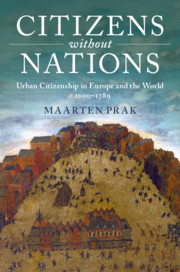Crossref Citations
This Book has been
cited by the following publications. This list is generated based on data provided by Crossref.
Hoogenboom, Marcel
Kissane, Christopher
Prak, Maarten
Wallis, Patrick
and
Minns, Chris
2018.
Guilds in the transition to modernity: The cases of Germany, United Kingdom, and the Netherlands.
Theory and Society,
Vol. 47,
Issue. 3,
p.
255.
Maire, Quentin
2019.
The Palgrave Handbook of Citizenship and Education.
p.
1.
Bijl, Paul
and
van Klinken, Gerry
2019.
Citizenship in Asian history.
Citizenship Studies,
Vol. 23,
Issue. 3,
p.
189.
Weerdt, Hilde De
2019.
Considering citizenship in imperial Chinese history.
Citizenship Studies,
Vol. 23,
Issue. 3,
p.
256.
Stuurman, Siep
2019.
Concluding observations: citizenship in cities, states and empires.
Citizenship Studies,
Vol. 23,
Issue. 3,
p.
277.
Džankić, Jelena
2019.
The Global Market for Investor Citizenship.
p.
25.
Munck, Thomas
2019.
Conflict and Enlightenment.
Bin Wong, R.
2020.
Citizenship in Chinese and Global History Before and After the 1890s.
International Review of Social History,
Vol. 65,
Issue. 1,
p.
125.
Morelon, Claire
2020.
Respectable Citizens: Civic Militias, Local Patriotism, and Social Order in Late Habsburg Austria (1890‒1920).
Austrian History Yearbook,
Vol. 51,
Issue. ,
p.
193.
Maire, Quentin
2020.
The Palgrave Handbook of Citizenship and Education.
p.
649.
Sánchez León, Pablo
2020.
The Study of Nation and Patria as Communities of Identity: Theory, Historiography, and Methodology from the Spanish Case.
Genealogy,
Vol. 4,
Issue. 1,
p.
23.
Simonton, Deborah
2020.
A Companion to Global Gender History.
p.
461.
Lynch, Katherine A.
2020.
Poor Relief, Welfare, and Community Building.
International Review of Social History,
Vol. 65,
Issue. 1,
p.
101.
Bauböck, Rainer
2020.
The Democratic Case for Immigration.
Politische Vierteljahresschrift,
Vol. 61,
Issue. 2,
p.
357.
Cesaretti, Rudolf
Lobo, José
Bettencourt, Luis M. A.
and
Smith, Michael E.
2020.
Increasing returns to scale in the towns of early Tudor England.
Historical Methods: A Journal of Quantitative and Interdisciplinary History,
Vol. 53,
Issue. 3,
p.
147.
2020.
Bibliography.
International Review of Social History,
Vol. 65,
Issue. 1,
p.
163.
Davis, Diane E.
and
Fernández, José Carlos
2020.
Collective Property Rights and Social Citizenship: Recent Trends in Urban Latin America.
Social Policy and Society,
Vol. 19,
Issue. 2,
p.
319.
Tröhler, Daniel
2020.
National literacies, or modern education and the art of fabricating national minds.
Journal of Curriculum Studies,
Vol. 52,
Issue. 5,
p.
620.
WELTON, MEGAN
2020.
THE CITY SPEAKS: CITIES, CITIZENS, AND CIVIC DISCOURSE IN LATE ANTIQUITY AND THE EARLY MIDDLE AGES.
Traditio,
Vol. 75,
Issue. ,
p.
1.
Kochenov, Dimitry
2020.
The Triumph of Ideologised Incompetence at Berlaymont – The 2019 Report on Investor Citizenship and Residence in the European Union.
SSRN Electronic Journal,



